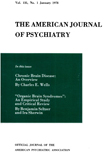Congenital and Perinatal Sensory Deprivation: Some Studies in Early Development
Abstract
Very early deficiency of coenesthetic (i.e., nonspecific) sensory experience results in gross, apparently irreversible, personality disturbances. The author presents evidence indicating that the high incidence of autistic disturbances in the congenitally blind is also due to coenesthetic deprivation. The congenitally deaf child, who tends to be very active and responsive during the early months of postpartal life, does not show the kinds of characterologic deviations regularly observed in the environmentally deprived and very frequently observed in the congenitally blind.
Access content
To read the fulltext, please use one of the options below to sign in or purchase access.- Personal login
- Institutional Login
- Sign in via OpenAthens
- Register for access
-
Please login/register if you wish to pair your device and check access availability.
Not a subscriber?
PsychiatryOnline subscription options offer access to the DSM-5 library, books, journals, CME, and patient resources. This all-in-one virtual library provides psychiatrists and mental health professionals with key resources for diagnosis, treatment, research, and professional development.
Need more help? PsychiatryOnline Customer Service may be reached by emailing [email protected] or by calling 800-368-5777 (in the U.S.) or 703-907-7322 (outside the U.S.).



